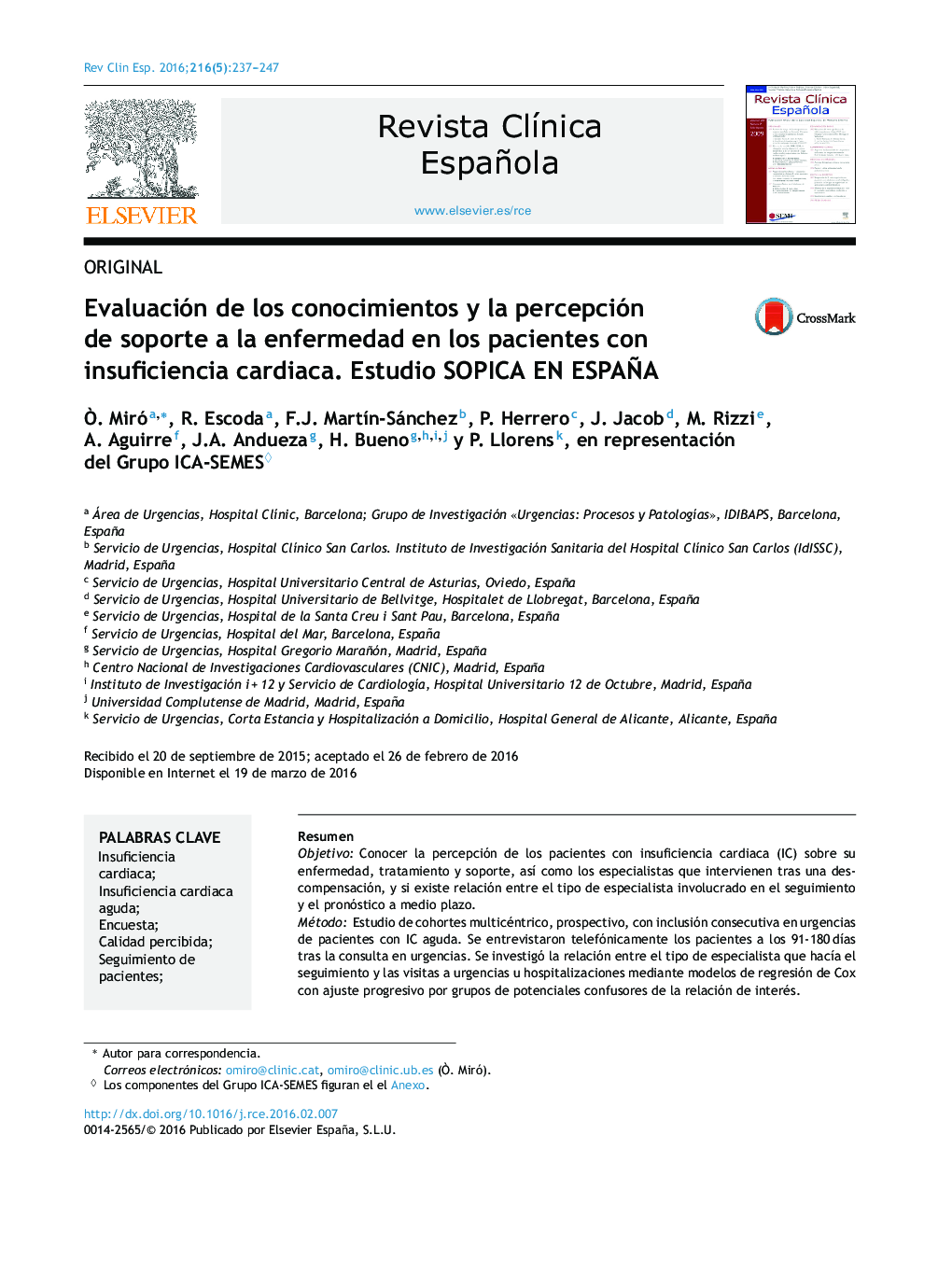| کد مقاله | کد نشریه | سال انتشار | مقاله انگلیسی | نسخه تمام متن |
|---|---|---|---|---|
| 3826889 | 1246906 | 2016 | 11 صفحه PDF | دانلود رایگان |

ResumenObjetivoConocer la percepción de los pacientes con insuficiencia cardiaca (IC) sobre su enfermedad, tratamiento y soporte, así como los especialistas que intervienen tras una descompensación, y si existe relación entre el tipo de especialista involucrado en el seguimiento y el pronóstico a medio plazo.MétodoEstudio de cohortes multicéntrico, prospectivo, con inclusión consecutiva en urgencias de pacientes con IC aguda. Se entrevistaron telefónicamente los pacientes a los 91-180 días tras la consulta en urgencias. Se investigó la relación entre el tipo de especialista que hacía el seguimiento y las visitas a urgencias u hospitalizaciones mediante modelos de regresión de Cox con ajuste progresivo por grupos de potenciales confusores de la relación de interés.ResultadosSe entrevistaron 785 pacientes: un 33% (IC 95%: 30-36%) consideraron su enfermedad leve, un 64% (60-67%) necesitaban ayuda de terceras personas para sus actividades diarias, un 65% (61-68%) no habían percibido cambios terapéuticos recientemente y un 69% (67-72%) perciben el mismo tratamiento en las agudizaciones. El soporte percibido varió significativamente dependiendo del factor considerado (de mayor a menor: familia, hospital, urgencias, centro de salud, religión y asociaciones de pacientes; p < 0,05 en todas las comparaciones). El 39% (36-43%) de pacientes con descompensaciones consultaron directamente a urgencias sin modificaciones previas del tratamiento y, al alta, el médico de cabecera (74%, 71-77%) y el cardiólogo (74%, 70-77%) fueron los más involucrados en el seguimiento, aunque la especialidad no se relacionó con el pronóstico.ConclusiónExisten diversos aspectos de percepción del paciente con IC respecto a su enfermedad susceptibles de futuras intervenciones. El seguimiento del paciente involucra a diferentes especialidades, pero todas consiguen resultados similares a medio plazo.
ObjectiveTo understand the perceptions of patients with heart failure (HF) concerning their disease, treatment and support, as well as the specialists who provide care after a decompensation, and to determine whether there is a relationship between the type of specialist involved in the follow-up and the medium-term prognosis.MethodsA multicentre, prospective cohort study consecutively included patients with acute HF in the emergency department. The patients were interviewed by telephone 91-180 days after their emergency department visit. We investigated the relationship between the type of specialist who performed the follow-up and the emergency department visits or hospitalisations using Cox regression models, with progressive adjustment by groups of potential confounders of these relationships.ResultsWe interviewed 785 patients. Thirty-three percent (95% CI: 30%-36%) considered their disease mild, 64% (60%-67%) required help from third parties for daily activities, 65% (61%-68%) had no recent therapeutic changes, and 69% (67%-72%) received the same treatment in the exacerbations. The perceived support varied significantly depending on the factor under consideration (from greater to lesser: family, hospital, emergency department, health centre, religion and patient associations; p < .05 in all comparisons). Thirty-nine percent (36%-43%) of the patients with decompensations consulted directly with the emergency department, with no prior changes in treatment. At discharge, general practitioners (74%, 71%-77%) and cardiologists (74%, 70%-77%) were the most involved in the follow-up, although the specialty was not related to the prognosis.ConclusionThere are various aspects of the perception of patients with HF concerning their disease that are susceptible to future interventions. Patient follow-up involves various specialties, but all achieve similar results in the medium term.
Journal: Revista Clínica Española - Volume 216, Issue 5, June–July 2016, Pages 237–247